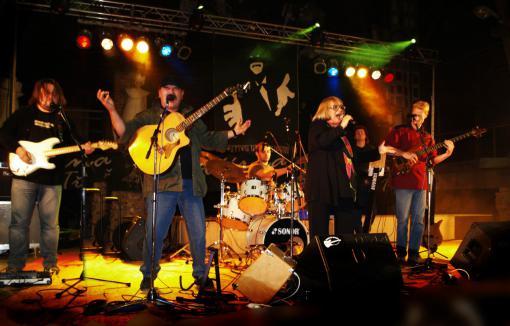Luboš Javůrek's Bokorama has never belonged to the absolute best of our folk scene but it has long maintained a position of a solid band whose melodic songs have the potential to reach a wide audience. More than a band, Bokomara is a trademark that covers various Javůrek projects – ranging from the singer-songwriter duo with Petra Šanclová to – today already traditional – the joint concert programme with Naďa Urbánková.
Today, in addition to the bandleader, the Bokorama band consists of Radek Mařík (guitar), Mirek Novotný (keyboard), Vojtěch Kabelka (bass) and Pavel Kříž (drums). So, it is a group that is able to play the folk-rock or even folk-pop repertoire perfectly. The new album with a slightly ironic title Pro nikoho (in English: For Nobody), however, is based on the concept of "Bokomara & amp; guests", as if Javůrek wanted to introduce his musical friends and colleagues through a time-lapse documentary (the album was recorded from 2013–16).
The studio was visited not only by the aforementioned Petra Šanclová but also the jazz singer Ženeva Dubská, great Slovak rhytmics Maťo Gašpar and Marcel Buntaj, universal Brno bassist Tomáš Koudelka, saxophonist Michal Žáček, classical underground violoncellist Josef Klíč and several amazing guitarists – Michal Pospíšil, Michael Vašíček, Martin Kostaš and Miloš Makovský. So, basically a "who ‘s who of Brno and the greater surrounding area". The number of guests is a major component of the album and it is a great pity – I consider it perhaps the greatest weakness of the record – that the booklet does not contain detailed information about the artists performing on individual tracks. Bokomara really did a poor job with the cover which is a shame also due to the fact that the lyrics have always been important for this band and it would be appropriate to print them in the booklet. But back to music. The songs on the new album share their rich sound and emphasis on the harmonic component. It does not mean that Bokomara uses extremely complicated chords, but instead that the harmonic progressions are in perfect harmony with Javůrek's melodies and they mainly strongly support the bandleader's Cohen-like narrative style of singing. Luboš Javůrek almost whispers in some songs (Sladká slova), but the rich accompaniment of guitars and the keyboard – in a good sense – fills the space. For comparison, I recommend listening to their older song Madalen (included on the record as a bonus) built rather on a strong melody of the solo singer and less on full accompaniment.
Both formats are relevant in the genre and the current sound tendency towards pop – in connection with the hit melodies – is definitely not a step in the wrong direction. While Luboš Javůrek composed the melodies himself, he usually has someone else write the lyrics. Some of his main collaborators are Milan Jablonský (Javůrek sang his lyrics, for example, on the "theatre" album Cenathálie or on the record of children's songs Co se děje v zoo) and Jiří moravský Brabec (author of the concept album Bokomarie). While Jablonský has seven sets of lyrics on the new album, Brabec only has two (including the title song Pro nikoho) and not his best ones.
Another author worth mentioning is Petr Pololáník, a singer-songwriter, who died exactly ten years ago. Luboš Javůrek chose the lyrics Sladká slova from his legacy. The fact that he does not sing his own words may lower Javůrek's authenticity but we can assume that many lyrics are tailored to him and we can find very personal elements and topics in them. An example is the song Žaloba with memories of times, fortunately, past (ID card, jeans, long hair). Lyricist Milan Jablonský takes us to another setting with his parody song Veselá tráva, in which, besides the topic given by its name (by the way, Veselá tráva was Javůrek's side concert project after 2000), he draws attention with the humorous depiction of tramp realities or a mention of dew on the tracks. Another distinctive song is the duet Poslední molo, where the structure of the verses (ABAB) corresponds to the structure of the entire song (alternating male and female voice). And the rhyme práská/láska (cracking/loving) surprisingly does not sound awkward at all in this song.
And again Jablonský – he also did well with his song Někdy mám náladu sung in a semi-hoarse and semi-whispering voice and lightly accompanied by saxophonist Žáček. On the contrary, one of the less successful songs is the strange song about love for an alien Hlavička do trojúhelníku (by the way, the rhyme kobře/dobře is not very original) and I also listen to the superficially erotic and somewhat rough ("I am a gladiator in the area of desire") lyrics by Vláďa Sulek Bohyně neřesti with a feeling of awkwardness. At least in these two cases, in my opinion, the band crossed the line and its pop is no longer listenable for me. The album Pro nikoho is not as thematically tight as older records Bokomary Bokomarie, Cenathálie and Hantec 3. Its concept comes close to the album Miláček, on which ten singers were guests in 2003. This time there were more than twenty guests who contributed to the full and solid sound of the record. And indeed, they deserve more in the booklet than just a list of names without reference to individual songs.
Luboš Javůrek, Bokomara & guests – Pro nikoho, own production 2016. 13 tracks, overall time: 45:02































